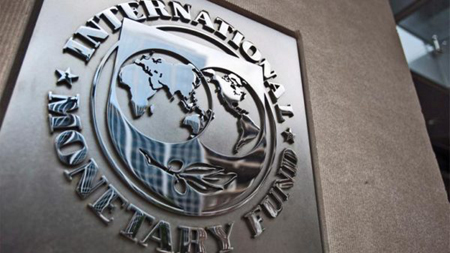Photo caption: International Monetary Fund logo
The International Monetary Fund has revised Nigeria’s 2025 economic growth forecast downward by 0.2 percentage points, citing lower oil prices as a key reason for the adjustment.
In its latest April 2025 World Economic Outlook report published on its website on Tuesday, the IMF said Nigeria’s real GDP is now projected to grow by 3.0 per cent in 2025, down from an earlier forecast of 3.2 per cent and below the 3.4 per cent growth estimated for 2024.
According to the Fund, the downgrade reflects the impact of declining oil prices on Nigeria’s fiscal and external balances, noting that energy exports remain the country’s dominant source of foreign exchange and public revenue. The growth rate is expected to slow further to 2.7 per cent in 2026.
The report read, “For sub-Saharan Africa, growth is expected to decline slightly from 4 per cent in 2024 to 3.8 per cent in 2025 and recover modestly in 2026, lifting to 4.2 per cent. Among the larger economies, the growth forecast in Nigeria is revised downward by 0.2 percentage point for 2025 and 0.3 percentage point for 2026, owing to lower oil prices, and that in South Africa is revised downward by 0.5 percentage point for 2025 and 0.3 percentage point for 2026, reflecting slowing momentum from a weaker-than-expected 2024 outturn, deteriorating sentiment due to heightened uncertainty, the intensification of protectionist policies, and a deeper slowdown in major economies.”
Despite maintaining a current account surplus, Nigeria’s external position is projected to weaken in the coming years.
The IMF estimates the country’s current account balance will shrink from 9.1 per cent of GDP in 2024 to 6.9 per cent in 2025, and further to 5.2 per cent in 2026.
The Central Bank of Nigeria recently reported a balance of payments surplus of $6.83bn for 2024, driven by a goods trade surplus of $13.17bn.
However, it appears that the surplus may not be sustained based on the latest IMF projections.
Investment bank JP Morgan earlier warned that Nigeria could slide into a current account deficit if oil prices remain below the fiscal breakeven benchmark of $60 per barrel.
Fitch Ratings offered a more positive outlook, projecting that Nigeria’s current account surplus, estimated at 6.6 per cent of GDP in 2024, will average 3.3 per cent between 2025 and 2026, supported by improved refining capacity and ongoing reforms in the energy sector.
On the inflation front, the IMF forecasts that Nigeria’s headline inflation will average 26.5 per cent in 2025—down from 33.2 per cent in 2024—but will likely surge to 37.0 per cent in 2026.
The projections come after the National Bureau of Statistics rebased the Consumer Price Index in January 2025, updating the base year from 2009 to 2024.
Following the rebasing, the inflation rate eased to 24.48 per cent in January, from 34.80 per cent in December 2024.
It fell further to 23.18 per cent in February before rising to 24.23 per cent in March, indicating continued upward pressure on consumer prices.
The Central Bank of Nigeria kept its Monetary Policy Rate unchanged at 27.5 per cent in February, maintaining a tight monetary stance to contain inflation.
However, it may be forced to hike rates further as inflation and money supply rose in March 2025.
The IMF also flagged weak income growth among Nigerians. It projects that Nigeria’s real output per capita will grow by just 0.6 per cent in 2025 and 0.3 per cent in 2026, reflecting limited gains in living standards.
This remains below the Sub-Saharan African average and highlights the slow transmission of growth to household incomes.



